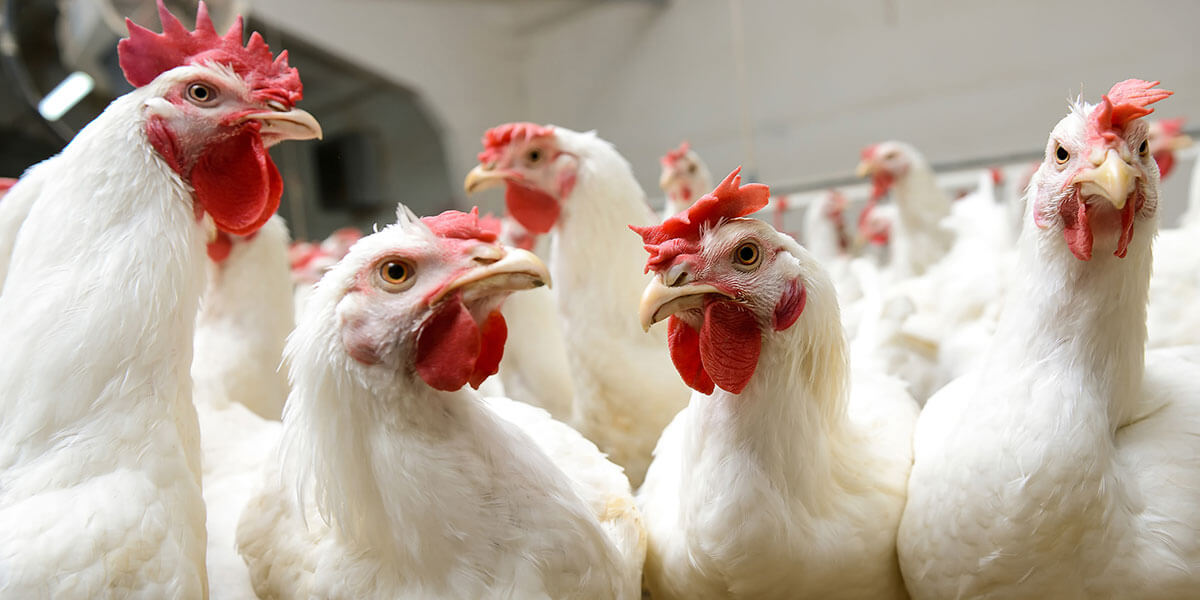The effects of heat stress can be costly for livestock and poultry producers. Heat stress leads to many production challenges that can affect growth, production and reproduction.
During heat stress, an animal’s core body temperature increases, causing blood flow to be diverted from the visceral blood vessels of the digestive tract to the skin in order to increase heat dissipation. As blood flow to the visceral tissue is reduced, so is the amount of oxygen (hypoxia) and energy available to the enterocytes (single layer of epithelial cells) lining the gastrointestinal tract. When this occurs, tight junctions that hold the enterocytes together weaken, allowing pathogens and their toxins to transfer into the bloodstream, ultimately leading to a condition called leaky gut.
Heat stress leads to many common production challenges, however some of the consequences of heat stress may be delayed in beef, dairy and swine. For example, lameness in the fall often occurs as a result of the animal developing a lower-quality foot horn tissue throughout heat stress in the summer.
In poultry, however, the production challenges are seen right away. Much like swine, chickens pant in order increase evaporative cooling. Evaporation of one gram of water is capable of dissipating 540 calories of maintenance energy, which can ultimately lead to the development of lower-quality eggs in layer hens and a lower feeding efficiency and growth rate in broilers.
Trace Mineral Nutrition for Heat Stress Management
Managing the production challenges related to heat stress can be mitigated by adjusting your livestock and poultry nutrition program. Producers should consider feeding a more nutrient-dense diet in the hot summer months to compensate for the reduction in feed intake. This can be done by reducing the amount of fiber in the feed and adding more fat to increase the number of calories in the feed.
Trace minerals can also play a big role in managing heat stress. Nutritionists and producers should consider feeding higher levels of performance trace minerals — especially zinc — during the summer heat stress months.
Why?
Because they are more efficient and available sources of trace minerals. Zinc is important for the formation of structural components of tissues, molecules and epithelial cells (enterocytes) present in the intestine. It strengthens the bonds between the epithelial cells in the gastrointestinal tract, helping to maintain the tight junctions during a challenge and decreasing the occurrence of leaky gut and related intestinal inflammation.
It is recommended that producers supplement 40 ppm of zinc from Zinpro zinc, regardless of the season. But zinc should be increased to at least 60 ppm and no more than 100 ppm in the summer when animals are dealing with heat stress. Trace mineral research conducted at Iowa State University shows that feeding zinc from Zinpro® Availa® Zn helps decrease the occurrence of leaky gut by improving the viability of the intestinal system.
Improve Thermal Tolerance with Chromium
Chromium from Zinpro® Availa® Cr or Zinpro® MICROPLEX® can increase thermal tolerance as well as it helps to reduce the level of cortisol or corticosterone — involved in regulation of energy, immune and stress responses — in livestock and poultry. Elevated levels of cortisol or corticosterone cause animals to behave in a hectic manner, expend energy, increase susceptibility to infections and, ultimately, reduce feed intake. Lowering cortisol or corticosterone levels by feeding diets supplemented with Availa-Cr or MICROPLEX can help keep animals calm and keep them more willing to eat during heat stress events.
Oxidative stress occurs when free radicals and antioxidants are out of balance. Zinc, copper, manganese and selenium work as antioxidants by removing free radicals and protecting cell membranes from oxidative stress. Requirements for these minerals increase during stress.
Controlling Lysine Ratios and Performance Trace Mineral Levels
While it’s important to increase your performance trace mineral levels as a part of a more nutrient-dense diet during the summer, it’s important to work with your operation’s nutritionist to make sure you’re not feeding too much zinc, manganese, selenium or chromium. Feeding too much can actually have a pro-oxidant potential, which will put more stress on an animal that is already dealing with heat stress.
Producers and nutritionists should also consider an appropriate lysine ratio when making nutritional adjustments. If we increase the energy density of the diet by increasing fat, we need to make sure they’re increasing essential amino acids, trace minerals and vitamins accordingly to maintain those ratios and adequate intake of all the different dietary components.
Heat stress can lead to a large number of production challenges in livestock and poultry and can be costly for producers. The effects of heat stress can be managed, however, with a more nutrient-dense diet in the summer and increasing levels of performance trace minerals.
Contact a Zinpro representative today to learn more about including Zinpro Performance Minerals®, like Zinpro Availa Cr, Zinpro MICROPLEX, Zinpro Availa Zn, Zinpro® Availa Mn, Zinpro® Availa® Cu and Zinpro® Availa® Se into your livestock and poultry nutrition programs.
Note: Not all products are available in all markets.

